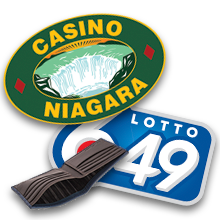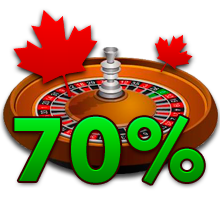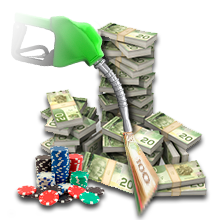Problem Gambling In Canada

Billions upon billions of dollars are spent each year in Canada on casinos, lottery tickets, video lottery machines, and other forms of land-based gambling options, as well as online gaming sites, including casinos, sportsbooks, and racebooks. Approximately $14 billion is wagered or risked on a yearly basis on gambling in Canada at land-based gaming venues. The amount that is spent online is unknown.
In comparison to other forms of entertainment, casino gambling in Canada generates about the same amount of revenue associated with movies, TV, sports, and music. This does not take into consideration the numerous opportunities to gamble at online casinos, many of which are run from a Native Canadian reserve located outside of Montreal. When you do add in Internet-based casinos, the gaming industry generates far more revenue than all other forms of entertainment in the nation.
Winning And Losing
Of course, there are many people who, over the course of time, are able to win money when gambling. Online casinos often boast of high payout percentages on their games. Payout rates can be as much as 97%, which means $0.97 of every dollar spent on a casino game finds its way back to a bettor.
This figure sounds very attractive to gamblers. However, it can create false expectations in that most people do not win substantial amounts of money when gambling. That 97% that is returned goes back either in small increments to many people or to the occasional big winner. Just because you wager at an online casino does not mean you’ll receive a payout. Someone else may win that money that you spent on a table game, slot, or video poker machine.
But many Canadians are lured by the promise of huge payouts, progressive jackpots, and low house edges. Easy access to online casinos means that at virtually anytime a person can risk cash on an online slot, table game, or scratch card. The push to win easy cash at online casinos and ease of accessibility have created a situation that is very dangerous for those who have a tendency towards compulsive gambling or who are dealing with a gambling problem.
Defining Problem Gambling
Just because someone gambles does not mean that they have a problem. Winning or losing does not define problem gambling, nor does how much one plays make one a problem gambler.
Gambling is a problem when it directly affects your life. When someone is taking risks at a table game, playing slots, sitting at the poker table, or buying a scratch ticket, and they cannot afford to take that risk. When gambling jeopardizes your ability to pay your bills, affects your family life, or interferes with your job, then you have a problem.
In essence, if you cannot control your urge to gamble, then you either have or are developing a real problem. If gambling is more important to you than anything else, your family, work, relationships, etc., then you require help.
One thing that is very important to understand, gambling is a mental health issue, and those who are addicted to it need assistance and support. The other thing to remember is that a large majority of those who do gamble do not have a problem.
What Are The Numbers?

In a recent report on problem gambling in Canada, it was noted that approximately 70% of Canadian adults gamble. Of all adults in Canada, the report observed that about 3% have been affected by a gambling problem that ranges from moderate to severe.
In terms of the overall Canadian population, the 70% of those who have gambled translates into 18.6 million people. Those 3% affected adversely number about 700,000. However, not all of those people who have been affected are gamblers. That 3% includes family members, friends, and others who have felt the effects of problem gambling due to another’s actions. That means that one person with a gambling issue may affect two, five, ten or more people. Those who are affected may or may not gamble themselves.
Do You or Someone You Know Have A Problem?
There is nothing wrong with visiting a land-based casino, buying a lottery ticket, or playing at an online poker room. But there are specific signs that you should be aware of that would indicate that you are a problem gambler.
You May Have A Problem
Signs of problem gambling include if you:
- Are habitually late for work or other activities due to gambling.
- Cannot pay your bills due to gambling losses.
- Are gambling rather than doing an activity you used to enjoy.
- Find you’re borrowing money to play at a casino.
- Don’t meet responsibilities or obligations due to gambling.
- Play at online casinos when you should be working.
- No longer attend to your children and instead focus on gambling.
- Withdraw from family and friends to play at a casino.
- Cannot keep track of your losses.
- Are bored when not gambling.
- Have extreme mood swings associated with betting.
What Should You Do?
If you believe that you have a gambling problem, it is important that you get help. If it is related to online play, there are various steps that you can take to get help.
Canadian online casino players may access a smartphone app, which is called Monitor Your Gambling & Urges, to help them. This app, which is useful to anyone who is gambling, allows you track your urge to play at gaming establishments. Accessed through your mobile device, it’s designed to work with your iPhone, BlackBerry, or Android.
This app records and tracks a variety of data, including when you have the urge to gamble, what your gambling triggers are, and the consequences of your gambling. It also offers information on other activities you can engage in besides gambling, how you feel if you did or did not play, and the positive consequences of not having risked your cash.
This app also keeps a tally of your losses and wins, which is very handy in determining the affect your online casino activities have on your financial situation. It allows you to review all of your online gambling activities and helps you determine if you do have a problem.
You may also want to try two other apps, especially if you cannot control your playing. Gamblock and Bet Filter can be installed on devices to block access to online casinos, poker rooms, and other gaming establishments.
Additionally, in order to control spending, you can request that your online casino lower your limits, or you may be able to do so yourself. Some casinos will do this by lowering how much money you can deposit over a given time. Some online gaming rooms allow you to set daily gambling and maximum betting limits. If you are unsure of how to do so, a call to customer service should help you restructure how much cash you can deposit and/or spend at your online casino.
If you do have a gambling problem, inform your online casino of such. Contact management, explain what you are dealing with, and ask them to suspend your membership for a certain amount of time. It may be a week, month, or more. It’s your choice.
This may be a tough road to go on alone. It is important to get help. For that reason, we have provided various resources at the end of this page that you may access.
The Gambler’s Fallacy – Fueling Excessive Betting

The Gambler’s Fallacy is a well-known belief to which many players adhere. It’s responsible, partly, at least, for so many gamblers getting into trouble financially. Many people will tell you point blank that it is a basic law of nature, but it is not.
The Gambler’s Fallacy works on the premise that with any 50-50 odds bet that the results at some point will even out. This fallacy is also used by bettors who make a successive string of wagers, one after the other, no matter what the odds are. The basic idea is if you lost the last bet then chances are much better that you’ll win the next, and as losses mount, your chances of winning your next wager increases.
As an example, if you are making the red/black bet in roulette, if you bet red and lose, then there’s a good chance red will come up on the next turn. If it does not, then there’s an even better chance it will hit the next time. In the end, the Gambler’s Fallacy holds that all bets equal out in the end.
But this is not true. That’s because the Gambler’s Fallacy is based on a false premise, which is that the outcome of one spin of the roulette wheel (or any other game or event you wager on) is related to the next, and the next spin is connected to the last. But this is not true. Every spin is an action unto itself and the outcome of that spin has no connection to what happened in the past or what will occur in the future. The results of each spin, or another type of chance betting, are random.
Thus, a gambler’s belief that “I have to hit on this spin because I missed on the last five,” is erroneous. But many people believe in this idea and they will not only continue to wager as losses mount, but they will often increase those wagers in an attempt to make up for losses. The result is usually that they lose everything.
If you chase losses, it’s time to stop. That will get you into trouble quickly.
Getting Help
If you believe that you are a problem gambler or if you know someone who is, it is never too early or too late to get help. There are many national and provincial organizations and groups dedicated to helping people with gambling issues.
The Canadian Centre on Substance Abuse is a very good resource and starting point for those with problems. This is an agency designed to help those with addictions, and for some, gambling is an addiction that is as powerful as one related to drugs. You can find them online at www.ccsa.ca.
Gamblers Anonymous provides those with gambling issues a strong support network dedicated to getting those who need help talking about and dealing with their gambling problems. You may locate them at www.gamblersanonymous.org.
Residents of Montreal may receive help from Gamblers Anonymous Montreal. Its contact number is (213) 386-8789, or, in Montreal, (514) 484-6666. Meetings are usually held at Our Lady of Fatima Church, 875 Marcil Laurin, St-Laurent, Montreal.
Most provincial governments in Canada have some sort of agency that is dedicated to fostering responsible gambling. The government of Ontario, Canada's largest province, offers www.knowyourlimit.ca. This is am amazing resource for those who reside in any province in Canada.
You’ll also find various regional help centers for those who are dealing with problem gambling. One such center, which is located in London, Ontario, is www.problemgamblinghelpline.ca. It will provide help to all Canadian residents. You may contact them by calling (519) 439-0174, or toll-free at 1-(888)-230-3505.
If you know someone who has a gambling problem, if you have one yourself, or even if you do not have an issue with gambling but would like some useful information, we recommend that you utilize these resources. They offer helpful information, create perspective, and provide you with anything you may need to take the next step.
Please do gamble responsibly, and if you cannot, please reach out for some help. You will receive it.

